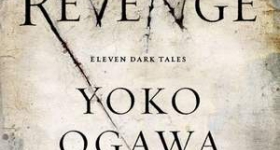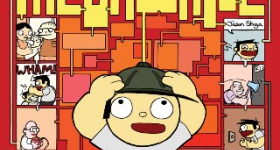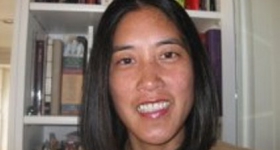Photo of the author by Melissa Frost
Don Lee writes for Don Lee.
This may sound like quite the self-important
statement to make, but Lee asserts it as fact, not bravado.
After all, Lee points out, writing is by nature a very individualized
practice.
But what drives the tale of his latest novel --
his third, after 2008’s Wrack and Ruin,
and his 2005 debut, Country of Origin
-- is actually an homage to what happens when writers and creative minds come
together, and to the friendships and rivalries that result.
The Collective, due out July 16, follows three friends -- Joshua Yoon, Eric Cho and
Jessica Tsai -- who find common ground in their desire to create and learn and
grow as artists of different mediums. The trio creates the 3AC (Asian American
Artists Collective) while attending Macalester College. Through the narrator
Eric’s eyes, they weave their way into the writing and artistic community in
Boston, learning much about identity and integrity along the way. There’s sex,
manipulation and abounding egos -- a recipe for any great story -- and, most
poignantly, nuanced depictions of race without hammering the point over the
head.
We asked Lee, a third-generation Korean American,
to speak a bit about his own journey in writing, the implied responsibility of
Asian American writers to bring ethnicity into the equation, and the best music
to listen to whilst whittling out a novel (hint: alt-country music).
Do you think there’s
an expectation for Asian American authors to write about Asian Americans and
the APA experience exclusively like several of your novel’s characters
initially question?
I do remember when I
was in grad school, I got a lot of shit that I should write about the “Asian
American experience,” which I resented like hell. Let’s say a writer is a
third-generation German American. Does he or she get pressured to write about
Germany or the German American experience? Of course not. So to rebel, I had
white or non-race-specific characters in my stories in grad school. But then I
wondered if it was rebellion or Twinkieism. There was certainly a rich well of
emotions in my views on identity and racism, and eventually I addressed them
full-on in a novella called “Yellow,” which became the title story of my
collection. Yet the other stories, though they had Asian American characters,
didn’t address race much, which was remarked upon in reviews as if it were
something revolutionary.
Chang-rae Lee was the
real revolutionary. For his third novel, Aloft, he had a 60-year-old
white guy living on Long Island as his narrator. That took guts. I think we’ll
soon see other Asian American writers pulling away in droves from having the
APA experience as their subject. Quite a few writers like Ed Park, Susan Choi,
and Sabrina Murray already have. And I almost certainly will, too.
You have such well-developed
characters in “The Collective” -- most especially Joshua, who seems to have so
many different layers of feelings and hurt that unravel through the course of
the novel. Were there any particular literary figures that you looked to for
inspiration in shaping his character? Or was it more a conglomerate of people from
real life?
More the latter. You
know, in every group, there’s always a leader, someone dynamic and larger than
life. I was never one of those people. But I had several close friends who
were, and what I always learned was that they were often delusional, and
congenital liars, and their dynamism was driven not by confidence but by
extreme insecurity. All of which makes people like that wonderful characters
for a novel.
What came to you first
when brainstorming and writing the book? What was the development process like
as you continued to write?
The opening with
Joshua’s suicide came first. Those three pages are all that remain from another
novel, which was going to be very dark and nasty, about a suicidal female poet.
I just wasn’t feeling that book, though, and after about a year I abandoned it.
I say that as if it were a blasé decision, but really it threw me into a deep
pit of panic and desperation. I thought my career was over, that I’d never
write another book. But what got me going with The Collective was the
thought of friendships, how they form and dissolve. I remembered all these
wonderful friends -- mostly writers and artists -- I’d had in my twenties and thirties
in Cambridge, and I wanted to write a love letter to that period of my life, to
all the starving artists I’d known.
You include so many references to different kinds of artists and creative
thinkers in the novel -- what kind of restraints do you think writing might
have that other types of art do not?
I have to say, I’m
jealous of the immediacy of other artists’ mediums. They can have a gallery
show or do a performance or present a film, and you can see or hear or
understand right away what they’ve been doing. It’s not the same giving a
reading. Let’s face it, readings are boring most of the time. And you can’t
give someone your book and get an instant response. Mostly what I’m jealous
about, though, is how finite and often collaborative the other arts are.
Writing novels is about being in a room alone … for years.
What’s your own personal writing regimen like? Do you have a good go-to cure
for writer’s block?
I used to write in
longhand -- that’s how old I am -- with a black Pilot Razor Point and
narrow-ruled yellow legal pads, but halfway through my third book, I started
writing on my laptop while listening to my iPod, and I haven’t looked back.
When I’m in full first-draft mode, I aim for two pages a day, on weekends and
during the summer.
I have a great
trick for writer’s block. You get a kitchen timer and set it for 20 minutes.
Once you press the start button, you cannot email, surf the Web, answer a call,
cannot get up to use the bathroom or fetch a glass of water. During those 20
minutes, you must sit at your desk and not move, and you can either write or
stare into space. Usually you end up writing, you’re so bored, and usually you’ll
go beyond 20 minutes. When the timer rings, you can do whatever you want, but
once you set it again, you’ve got to stay put.
The Collective seems rooted in the theme of camaraderie, and what it
means to have a community to learn and grow from. What’s been the most
memorable criticism you’ve ever gotten for your work from your peers?
My writer friends are
very supportive. That’s not to say they softball their criticism. Somewhere
along the way, I learned that it’s best to trade manuscripts with people who
are at similar points in your careers. When someone is above or below you,
weird personal agendas can intrude. But it’s so important to have other writers
and artists around you. No one else can really understand what the hell you’re
trying to do with your life.
The most memorable
criticism I’ve ever received was from a well-respected editor who was then at
W. W. Norton (ironically the eventual publisher of all my books). That novella,
“Yellow” -- I sent it to her when I was in my early thirties, and she said she
thought I hadn’t found my voice yet and maybe I wasn’t cut out to be a writer.
It took me about five years to get over that comment.
Of your four books, which has been the most
personal? The most difficult to write?
Oh, definitely this one. It’s not
exactly autobiographical, except for some of the narrator’s romantic debacles,
but it’s very personal to me, delving into all the doubts I’d had as an
aspiring writer. I came very close to quitting several times. At one point, I
was getting applications to grad programs in psychology, thinking I should
become a therapist or counselor and stop chasing this quixotic dream of
becoming a writer. No one was trying to convince me otherwise.
The challenge is different now. I think
once you’re published, each new book becomes more difficult, mostly because
you’re reflecting on disappointments: you never hit the big time, your books
aren’t selling, you’re not getting awards, no one loves you. Being a midlist
writer is the most tenuous position in publishing these days. Trying to sell
your third or fourth or fifth book is infinitely harder than selling a debut. So there’s a lot at stake. You
question why you’re writing, what you’re trying to accomplish as a writer. But
eventually you have to say fuck it, I’m going to return to the purity of my
original vision and write what I’m moved to write, and if no one wants to read
it, so be it.
Who are you reading now and who inspires you?
I’ve been reading some
short novels, since that’s what I’m planning to do with my next book: Train
Dreams by Denis Johnson and Running Away by Jean-Philippe Toussaint. But what’s
inspiring me most is alt-folk indie music (because I’m thinking of having a
singer-songwriter as a character): Ryan Adams and his old band, Whiskeytown,
Damien Jurado, Iron & Wine, Sun Kil Moon. During the writing of The
Collective, during the most crucial part of the first draft, I played five
albums by Clem Snide in continuous rotation. That band saved my life.
Don Lee will participate in a “salon-style multimedia show-and-tell” and share his writing
process for The Collective at the Asian
American Writers' Workshop on Thursday, July 26.
***
Joyce Chen is a second-generation Taiwanese American
journalist and current multimedia editor at the New York Daily News, where she
covers viral videos, recaps "The Bachelorette" and wades her way
through all things entertainment and gossip - with tongue firmly in cheek, of
course. She originally hails from Cerritos, Calif. and graduated with degrees
in print journalism and psychology from the University of Southern California,
where she was previously the editor-in-chief of the Daily Trojan. Her writings have
been published in People magazine, Los Angeles magazine and the Los Angeles
Daily News.









Comments